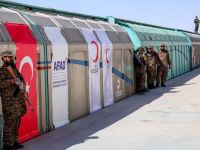Nevertheless, supporters of the prime minister hailed the resolution as a political success for Barak and a defeat for his putative challengers. The prime minister, they were quoted as saying, had delivered an object lesson in his ability to mold the central committee to his will.
The resolution came at a central committee meeting that was itself called on short notice and from which some party figures, among them Shimon Peres, were conspicuously absent, said the paper.
Haaretz added that critics of Barak in the party had complained that the hastily convened meeting seemed to signify that the prime minister's followers were plotting a "grab" at the prime ministerial candidacy. Labor secretary-general Ra'anan Cohen, in order to allay their suspicions, promised that no resolution pertaining to the prime ministership would be discussed.
According to the daily, the resolution calls on members of the party and its elected representatives "to fall in behind the prime minister in his struggle with the military and diplomatic challenges he faces, and to unite behind him in leading the party in the upcoming election."
The chairman of Labor's constitution committee, attorney Hanan Meltzer, took the podium to explain that the resolution was not binding on the party in the legal sense and would not prevent a leadership contest, said Haaretz. It was a declaration of support valid only in the "public-political sense," Meltzer ruled.
Supporters of Knesset Speaker Avraham Burg, who is considering running against Barak for the party leadership and the prime ministerial candidacy, claimed they had not been invited to attend the central committee meeting in order to create the impression that almost all of those present backed Barak. Labor spokesman Yerach Tal dismissed this allegation as "rank lies." Burg himself did attend the central committee meeting, and studiously sidestepped journalists' questions as to his intentions. He left the hall before the vote.
Barak, in his speech to the central committee, called for party unity at this time of national emergency and domestic instability. He said the election was inopportune for the nation, but had been forced upon it by political machinations.
He encouraged the central committee members not to be discouraged by current opinion polls that show him trailing far behind the presumptive Likud candidate, Benjamin Netanyahu. "I would like to remind people where Netanyahu was in the polls three months before he beat Peres, and where I was three months before I beat Netanyahu."
A poll conducted early in the week, and published Friday by the Jerusalem Post said that 47 percent of those questioned voiced support for the former premier and Likud leader, while only 25 percent favored the incumbent - fewer than those who said they would not take part in the election.
Next week, the central committee is to meet again, said Haaretz, this time to discuss a proposal to abolish the direct election system for prime minister and revert to the old system whereby the voter had just one ballot, and cast it for the party of his choice. A majority in Labor is believed to support the proposal. If the central committee approves it, that decision will bind all of the Knesset faction - including Barak, who opposes it and prefers to retain the present voting system, said the paper – (Several Sources)
© 2000 Al Bawaba (www.albawaba.com)







